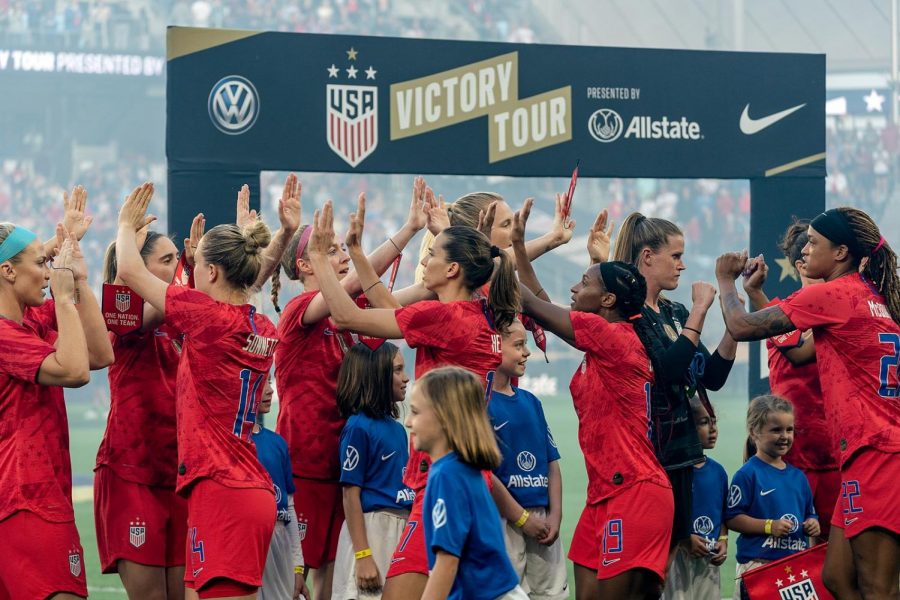‘We will never stop fighting for EQUALITY.’ The USWNT campaign for equal pay
In April 2016, five players from the US Women’s National Soccer Team filed a complaint for wage discrimination with the Equal Employment Opportunity Commision on behalf of the entire team. Three years later, in early 2019, the team retracted their complaint due to a lack of progress and instead sued the U.S. Soccer Federation. By this point, the campaign was composed of 28 players and it was receiving considerable public attention.
Despite this long battle for justice, on May 1 Federal Judge R. Gary Klausner rejected the USWNT’s claims to wage discrimination.
According to espn.com, in July 2019, USSF President Carlos Cordiero presented nearly 10 years of data showing that from 2010 to 2018 U.S. Soccer paid the women’s players a total of $34.1 million in salary and game bonuses, while the men’s players were paid a total of $26.4 million.
It’s important to note that the cumulative salary for the USWNT reflects the players’ salaries for both the national-team and for their club teams, since all 23 players on the women’s World Cup team play for the National Women’s Soccer League. The cumulative salary for the men only reflects the player’s salaries for the US Men’s National Team and not their professional teams.
USWNT spokesperson Molly Levinson said the federation’s numbers “inappropriately include the NWSL salaries of the players to inflate the women’s players compensation. Any apples to apples comparison shows that the men earn far more than the women.”
Senior LBD co-captain and Rutgers soccer commit Faith Dobosiewicz said, “Considering how much less [the USWNT] gets paid in every aspect, whether it is a friendly or making the World Cup squad, compared to the USMNT is truly unfair.”
According to espn.com, “[Men’s] appearance fees and bonuses in most cases are considerably higher.” When a men’s player makes a World Cup team, he makes roughly $68,750. On the other hand, a women’s player will make $37,500. When the USMNT beats a team outside the top 25 in the FIFA rankings, each player gets a bonus of $9,375. A loss to a team outside the top 25 still results in payment of $5,000. On the contrary, when the women beat a team ranked outside the top eight, each player makes $5,250, but when they lose to a team outside the top eight, they receive nothing.
While the cumulative salaries for the men’s and women’s teams are hard to corroborate, when individual earnings are broken down, it’s clear that there’s a disparity between the salaries of both teams.
When analyzing the men’s and women’s salaries it’s also pivotal to consider the success of each team. In Klauser’s decision, he admits that, “unlike the MNT, the WNT has achieved largely unrivaled success.”
From 2010 to 2018 the USWNT experienced many more victories than the USMNT. The men made it to the round of 16 in the 2010 and 2014 World Cups. Then, in 2018, the men didn’t even qualify for the tournament. On the other hand, the women’s team placed second in 2011 and won the 2015 World Cup.
While the women’s success has far exceeded the men’s, it’s noted that the men’s team has historically generated more revenue from their games, contributing to the difference in pay grade. While there are a variety of other factors the USSF must consider in determining a player’s salary, it’s far too early to reject the USWNT’s claims to wage discrmination due to the ambiguity of the evidence provided.
In February 2020, the men’s team voiced their support for the USWNT’s equal pay campaign. In a statement, the USMNT said, “The Federation has been working very hard to sell a false narrative to the public and even to members of Congress.”
Despite this collective push for equal pay, Klausner ultimately decided to dismiss the women’s claim to wage discrimination. Soon after the decision was announced, co-captain Megan Rapinoe took to Twitter and said, “We will never stop fighting for EQUALITY.”
The fight is certainly not over. On May 8, seven days after the decision, the team filed an appeal. Levison said the team will continue to “press on” in order to achieve justice.

